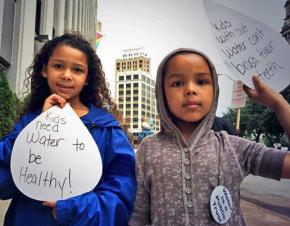Fighting for water in Detroit
reports from Detroit on a struggle for the most basic of human rights.
PROTESTERS GATHERED outside of Detroit's Cadillac Place on June 30 to demand that Michigan Gov. Rick Snyder stop the city's Water and Sewage Department (DWSD) from shutting off water to 150,000 homes.
"This is everybody's fight, water is a human right!" shouted demonstrators, as passing motorists honked to show their support. Activists directed their demand for an immediate moratorium on the shutoffs to the state's Republican governor because he now rules Detroit--since March 2013, the city's mayor has had no authority under the emergency manager law pushed through the state legislature.
Three days earlier, demonstrators marched on the Detroit Water Board building to insist that the shutoffs are a violation of human rights.
On June 18, a coalition of social justice and welfare rights organizations submitted a report to the United Nations describing how poor Detroiters can't afford their bills and asking for intervention as a human rights issue. "[Detroit] residents have seen water rates rise by 119 percent within the last decade," according to the report. Cutoffs cause major problems for some of the city's poorest residents. "People recovering from surgery can't wash and change bandages," the report states. "Children cannot bathe and parents cannot cook."

The submission to the UN also describes how water shutoffs are straining class and racial tensions as poor Detroiters, disproportionately African American, lose their homes. According to the Michigan Welfare Rights Organization, overdue water bills are being transferred onto homeowners' property taxes--which makes them vulnerable to foreclosure if they can't pay.
Ultimately, the report concludes that the shutoffs should be seen as part of a ploy to push the city's poor out of their homes so they can be snatched up on the cheap by investors, accelerating Detroit's gentrification. The racism at the heart of these calculations and the water cutoffs is likewise a violation of human rights, according to the organizations appealing to the UN.
AS THE city continues to grapple with creditors in bankruptcy court over an $18 billion debt, its residents--especially poor and Black residents--are enduring the brunt of attempts to shore up revenue.
In March, the DWSD announced it would begin taking action against customers with balances exceeding $150, or who are two months behind on payments. The average household owes about $540. In May, the department sent out 46,000 warnings and cust service to more than 4,500 residents. Meanwhile, as the city was cutting off service to thousands of homes, the Detroit City Council approved an 8.7 percent rate hike for water in mid-June.
Detroit was already suffering economically before the Great Recession hit, but its foreclosure and unemployment rate skyrocketed since 2008. By 2011, Detroit's median household income was about $25,000 a year--half of the national median--making it one of the poorest cities in the nation.
Detroiters have little recourse in preventing the shut offs, since the city is now under the control of Emergency Manager Kevyn Orr and his boss, Gov. Snyder. Orr's callous attitude toward those struggling to pay for water became clear in June when he began reviewing bids for privatizing the Water and Sewage Department--in order to stem a seven-year deficit of $1.5 billion.
In 2012, DWSD made about 20 cents on every dollar it took in. Despite this surplus, it still requires $696 million over the next five years to pay for crumbling infrastructure. Another problem is that the DWSD has failed to turn off water to many of the estimated 78,000 abandoned buildings in the city. This past winter, streets flooded and turned to ice when pipes burst in a number of these buildings.
Of course, any money to be made off the privatized water system will be done by increasing rates, creating an even higher hurdle for ordinary people to afford water in Detroit. But political leaders have different priorities than helping those having a hard time. The city had no problem subsidizing 60 percent of a new $450 million hockey arena at the behest of billionaire Mike Illitch, owner of the Little Caesars pizza chain as well as the Detroit Red Wings and Detroit Tigers. Meanwhile, the water department had to rely on private donations--to the tune of $800,000--for a program to help Detroiters struggling to pay their water bills.
On June 23, a team of experts issued a news release calling the water shut-offs "a violation of the human right to water and other international human rights." One member of the team stated that if the shut-offs disproportionately affect African-Americans, then they are racist and a violation of treaties ratified by the US .
Access to water is a human right. Yet in the age of neoliberalism, the rulers of Detroit, led by Rick Snyder and Kevyn Orr, are using the city's bankruptcy as an opportunity for carving up public services and privatizing them. DWSD isn't the first public service to to on the auction block. Detroit Public Schools, which is also under the control of an emergency manager, currently authorizes 12 charter schools.
The city is also catering to wealthy business owners interested in gobbling up properties on the cheap. Because of this, residents look at the DSWD's failure to invest in infrastructure, shut off water to abandoned structures, and assist residents in paying their bills, and they see another scheme to hasten gentrification--by making it too expensive for residents to stay in their homes, and giving real estate developers more opportunities to buy homes for practically nothing from residents facing foreclosure and eviction.
Activists are planning actions to pressure the emergency manager and governor to stop the shutoffs and keep poor Detroiters in their homes. But we also need to take the next step and organize to keep schools, transportation and all other public services from ending up on the privatizers' auction block.


